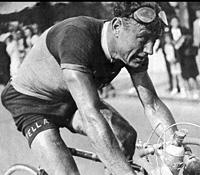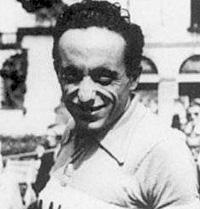
Recently on Cyclingnews.com |
Tales from the peloton, April 19, 2006
The ultimate Roubaix controversy
The disqualification in this year's Paris-Roubaix of three riders, two of whom would have been on the podium, caused one of the biggest controversies in the history of the race (see our special letters page). The president of the UCI even weighed in. But that was nothing compared to the fuss over the 1949 finish. Les Woodland has the tale.
Good, wasn't it, Paris-Roubaix?
Ah yes, but they don't make them like in the good old days. In the good old days when men were men, the winner didn't just ride round the track. Oh goodness no… he didn't think he'd had a good day out unless he'd got into the track by a back door and then climbed down over the seats.
That's what you call a real Paris-Roubaix. Except that you think I'm talking out of my hat, don't you? But no… Just look at the list of winners and you'll see that in 1949 there were two. There was the one who climbed down through the seats and the one who finished four riders later but crossed the line by going round the track. It is the most bizarre story in a major bike race - except perhaps for the world sprint championship in which an official poked a finalist in the eye with a flag. But that will have to wait for another day.
The story of Paris-Roubaix in 1949 didn't end with two winners. It went on and on for months and took two international conferences to sort out.
What happened was that there was a break of three. As ever, they came through the town and then reached the narrow roadway that leads to the ramp into the track. That's the one that you see on television, the one that comes through the tunnel. You'd think if anyone knew the way to go it would be the officials but, no, one of them managed to send the riders the wrong way. If they should have gone right, he sent them left.
Desperately, finding themselves outside the track with no obvious way to get in, André Mahe, Jacques Moujica and Frans Leenen looked for somewhere to go. Their nerves were taught and their veins full of adrenaline. To say they were jumpy would understate the case somewhat. Moujica quickly saw there was no point riding any further round the outside of the track and he turned a tight circle, lost his balance and fell off. All the troubles of getting to Roubaix were nothing compared to the last few metres because the fall broke his pedal.
Leaving Moujica to look after himself, Mahe and Leenen found not the way in they should have used but, by this time anywhere being better than nowhere, pushed at a door and found it led to the press seats. And that was how they finished Paris-Roubaix, scrambling down through the seats and the bewildered reporters before climbing over the fence to the banking, getting back on their bikes and sprinting for the line.
For the judge, Henri Boudard, that was good enough. It was unconventional, he couldn't help thinking, but Mahe had started in Paris and he had got to Roubaix and he had crossed the line before the rest. He named him the winner and sent him on his lap of honour.
It wasn't the way that Mahe would have chosen to win but in the circumstances it was sufficient and he waved to the crowds before heading off to the shower. It was then that things became still more ludicrous. A few minutes later the bunch made it into the stadium by the conventional route. Muddied and bloodied, they were led to the line by Serse Coppi, brother of Fausto.
There were no earpieces in those days, of course, and at first Coppi felt happy enough to have won the bunch sprint. But when he heard how the break had got to the line, he began to argue that it was he who should be named the winner. With the sort of logic you'd find hard to refute, he said he could admire Mahe's initiative in climbing down through the seats but that wasn't part of the course and therefore he should be disqualified or demoted.
If you think there was some justice in his argument, then so did the judges. They changed their mind and gave victory to Coppi. Moments later the unfortunate Boudard was surrounded by waving arms from both sides as he kept repeating "I only followed the rules, I only followed the rules".
The organisers didn't have to be quite so dogmatic and, recognising the responsibility they had for the mess-up, they gave Mahe and the others their prizes anyway. And five days later the French federation confirmed Mahe as winner. And not Coppi.
"It couldn't be otherwise," said Achille Joinard, the federation's president.
"It certainly can!" shouted the Italians and they went banging on the door of the UCI. The row was now international. In August - the race had been in April - the UCI feared to upset either France or Italy and decided to cancel the race and the result along with it. But it must have recognised that as a non-answer because it said it'd meet again in November and think again.
By November, Belgium had joined in, siding with Italy and rounding on Joinard by claiming that he was less concerned with getting a fair result than with becoming UCI president. An already bitter row was now sulphuric and it was still going on when the UCI finally met again and, close to desperation, un-cancelled the race and gave it to both riders.
"Thank heavens there's another Paris-Roubaix in four months," one official groaned. And everybody went home, tired but unhappy.
[Editor's note: Fans of the super-tough riders who battled across Northern France in the early days of paris-Roubaix will, we hope, enjoy this collection of photos of the Paris-Roubaix winners 1896-1950.]


